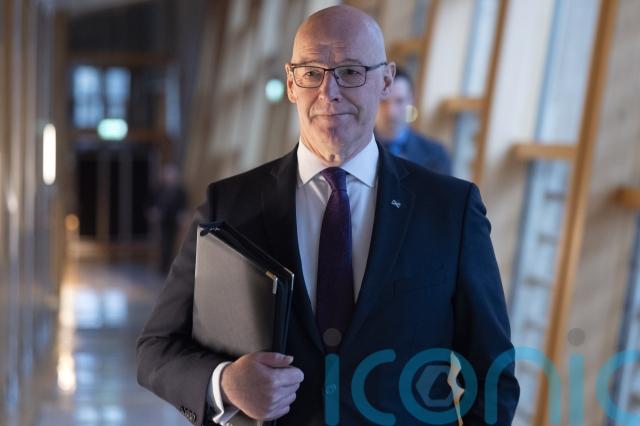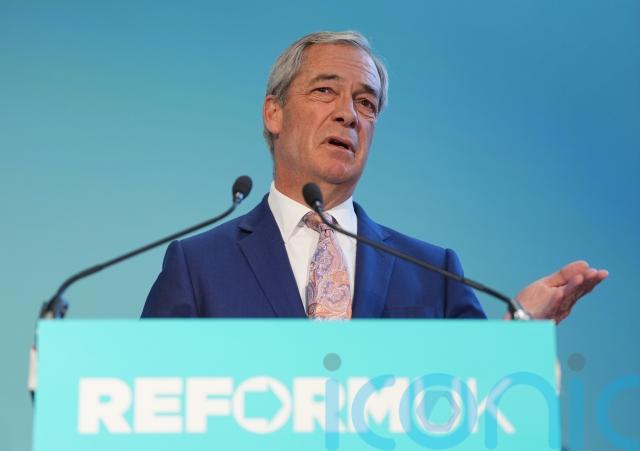
John Swinney has said he has “no doubt” the Prime Minister will be unable to remain in office if the SNP wins an overall majority at next year’s Holyrood election.
The Scottish First Minister told how he believes an SNP majority – which has only happened once in the history of the Scottish Parliament – could topple Sir Keir Starmer.
He also told an event in London his relationship with Sir Keir is in a “testing period now” in the run-up to that Holyrood vote in May 2026.
Mr Swinney has set the SNP the target of winning more than half the 129 seats up for grabs in the Scottish Parliament – pointing out when this happened in 2011 it triggered the 2014 independence referendum.

Addressing an Institute for Government event, the SNP leader added: “If that was to happen in May of next year, then I have no doubt that the Prime Minister would not survive in office.”
Pressed on the difference between a majority for the SNP and a pro-independence majority also involving the Sottish Greens, as there is at present at the Parliament, Mr Swinney said simply: “The difference is that the SNP-only majority was not ignored.
“That’s the big difference, and that’s what sets the precedence.”
With the UK Government having rebuffed all the Scottish Government’s calls for a second independence referendum since 2014, Mr Swinney argued it is “democratically unhealthy” for there not to be a route to a fresh ballot.
Saying the UK is a voluntary union, the First Minister added: “There has to be a route whereby the parties to that union can say if they want to live differently.
“I don’t think it is legitimate for the democratic wishes of the people of Scotland to be in any way thwarted in what they wish to be.
EVENT | In conversation with John Swinney MSP, First Minister of Scotland@JohnSwinney joins us to discuss his priorities as First Minister, and the SNP’s vision ahead of the 2026 Scottish parliament election. @AkashPaun https://t.co/BWVQTGywGM pic.twitter.com/osdUF1rtSU
— Institute for Government (@instituteforgov) November 16, 2025
“Precedent is important here. The argument I am deploying is that we are in a logjam just now about the constitutional question.
“At this moment there is a majority of the Scottish Parliament that believes Scotland should be an independent country and there should be a referendum to enable that to be the case, and that is not able to be advanced because of the stance of the United Kingdom Government.”
With the SNP having secured the 2014 referendum after winning an overall majority in 2011, Mr Swinney insisted there is a “very clear and demonstrable case that that precedent should be respected”.
He also said the “political mood in Scotland and the rest of the United Kingdom are moving in significantly different directions”.
He said south of the border the debate is “shaped increasing” by the rise of Reform UK, with the SNP leader claiming political parties in England are “moving on to the territory that is occupied by Nigel Farage” as a result.
He said that is in contrast with “the prevailing sentiment in Scotland which does not go along with this direction of thinking”.

The First Minister added he does not believe the current devolved arrangements will be able to protect Scotland from a government led by Mr Farage – whose party is ahead in the polls south of the border.
Mr Swinney spoke of the “need to have different constitutional arrangements that will protect Scotland from the politics of Farage and Reform”.
He said he doubts current constitutional arrangements “can enable us to do that” as Holyrood is already seeing an “erosion of the devolved settlement” – citing the Internal Market Act, introduced by the UK Government to regulate trade between the four nations post-Brexit, as an example of this.
The SNP leader also used the event in London to urge the UK Government to end the policy of austerity “once and for all” when Chancellor Rachel Reeves delivers her Budget next week.
The Budget has got to “support households wrestling with the cost of living” and “address the very significant energy costs households are having to deal with”, he said.
Mr Swinney continued: “The Budget has got to make an impact on household income, but it has also got to make an impact on public services, because the issues and the challenges that the public services are wrestling with are longstanding as a consequence of the impact of austerity.
“What the Budget has got to do is to end that austerity once and for all.”
Subscribe or register today to discover more from DonegalLive.ie
Buy the e-paper of the Donegal Democrat, Donegal People's Press, Donegal Post and Inish Times here for instant access to Donegal's premier news titles.
Keep up with the latest news from Donegal with our daily newsletter featuring the most important stories of the day delivered to your inbox every evening at 5pm.